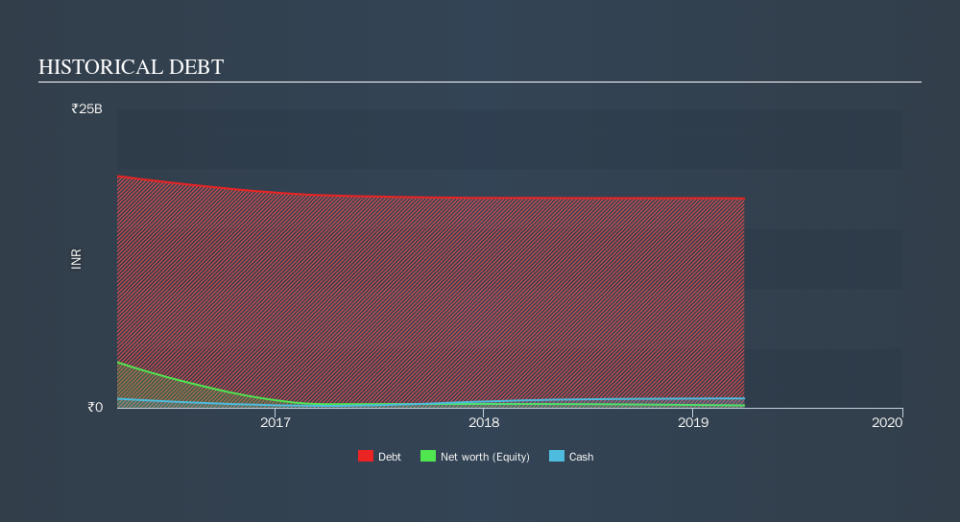Is ARSS Infrastructure Projects (NSE:ARSSINFRA) A Risky Investment?

Warren Buffett famously said, 'Volatility is far from synonymous with risk.' When we think about how risky a company is, we always like to look at its use of debt, since debt overload can lead to ruin. As with many other companies ARSS Infrastructure Projects Limited (NSE:ARSSINFRA) makes use of debt. But the real question is whether this debt is making the company risky.
When Is Debt A Problem?
Generally speaking, debt only becomes a real problem when a company can't easily pay it off, either by raising capital or with its own cash flow. Ultimately, if the company can't fulfill its legal obligations to repay debt, shareholders could walk away with nothing. While that is not too common, we often do see indebted companies permanently diluting shareholders because lenders force them to raise capital at a distressed price. Having said that, the most common situation is where a company manages its debt reasonably well - and to its own advantage. The first thing to do when considering how much debt a business uses is to look at its cash and debt together.
See our latest analysis for ARSS Infrastructure Projects
What Is ARSS Infrastructure Projects's Debt?
The chart below, which you can click on for greater detail, shows that ARSS Infrastructure Projects had ₹17.6b in debt in March 2019; about the same as the year before. However, it also had ₹781.9m in cash, and so its net debt is ₹16.8b.
A Look At ARSS Infrastructure Projects's Liabilities
Zooming in on the latest balance sheet data, we can see that ARSS Infrastructure Projects had liabilities of ₹18.6b due within 12 months and liabilities of ₹56.4m due beyond that. Offsetting this, it had ₹781.9m in cash and ₹1.23b in receivables that were due within 12 months. So its liabilities total ₹16.7b more than the combination of its cash and short-term receivables.
This deficit casts a shadow over the ₹646.9m company, like a colossus towering over mere mortals. So we definitely think shareholders need to watch this one closely. At the end of the day, ARSS Infrastructure Projects would probably need a major re-capitalization if its creditors were to demand repayment. The balance sheet is clearly the area to focus on when you are analysing debt. But you can't view debt in total isolation; since ARSS Infrastructure Projects will need earnings to service that debt. So when considering debt, it's definitely worth looking at the earnings trend. Click here for an interactive snapshot.
Over 12 months, ARSS Infrastructure Projects saw its revenue drop to ₹4.6b, which is a fall of 21%. To be frank that doesn't bode well.
Caveat Emptor
Not only did ARSS Infrastructure Projects's revenue slip over the last twelve months, but it also produced negative earnings before interest and tax (EBIT). Indeed, it lost a very considerable ₹141m at the EBIT level. Reflecting on this and the significant total liabilities, it's hard to know what to say about the stock because of our intense dis-affinity for it. Sure, the company might have a nice story about how they are going on to a brighter future. But the reality is that it is low on liquid assets relative to liabilities, and it lost ₹118m in the last year. So we think buying this stock is risky, like walking through a minefield with a mask on. When we look at a riskier company, we like to check how their profits (or losses) are trending over time. Today, we're providing readers this interactive graph showing how ARSS Infrastructure Projects's profit, revenue, and operating cashflow have changed over the last few years.
If, after all that, you're more interested in a fast growing company with a rock-solid balance sheet, then check out our list of net cash growth stocks without delay.
We aim to bring you long-term focused research analysis driven by fundamental data. Note that our analysis may not factor in the latest price-sensitive company announcements or qualitative material.
If you spot an error that warrants correction, please contact the editor at editorial-team@simplywallst.com. This article by Simply Wall St is general in nature. It does not constitute a recommendation to buy or sell any stock, and does not take account of your objectives, or your financial situation. Simply Wall St has no position in the stocks mentioned. Thank you for reading.

